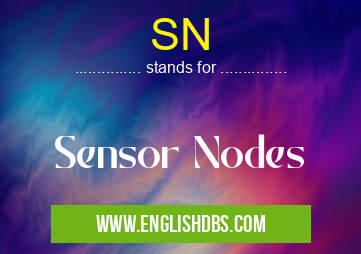What does SN mean in UNCLASSIFIED
SN stands for Sensor Nodes in the context of MISCELLANEOUS. These are small, wireless devices that are used to collect and transmit data from their surroundings. SNs are typically equipped with sensors that can measure various environmental parameters, such as temperature, humidity, light, and motion. They can also be equipped with communication modules that allow them to transmit data to a central hub or gateway. SNs are often used in applications such as environmental monitoring, industrial automation, and healthcare.

SN meaning in Unclassified in Miscellaneous
SN mostly used in an acronym Unclassified in Category Miscellaneous that means Sensor Nodes
Shorthand: SN,
Full Form: Sensor Nodes
For more information of "Sensor Nodes", see the section below.
Key Features of Sensor Nodes
- Small size and low power consumption: SNs are typically small and lightweight, making them easy to deploy and conceal. They also have low power consumption, allowing them to operate for long periods of time on batteries.
- Wireless communication: SNs are typically equipped with wireless communication modules, such as Bluetooth or Wi-Fi, allowing them to transmit data to a central hub or gateway.
- Sensors: SNs are equipped with sensors that can measure various environmental parameters, such as temperature, humidity, light, and motion.
- Data processing: Some SNs are equipped with microcontrollers or microprocessors that allow them to process data before transmitting it.
Applications of Sensor Nodes
- Environmental monitoring: SNs are used to monitor environmental parameters such as temperature, humidity, air quality, and water quality. This data can be used to track pollution levels, monitor climate change, and manage natural resources.
- Industrial automation: SNs are used to monitor and control industrial processes, such as manufacturing assembly lines and power plants. They can collect data on temperature, pressure, flow rate, and other parameters to ensure that processes are running smoothly and efficiently.
- Healthcare: SNs are used to monitor patients' vital signs, such as heart rate, blood pressure, and blood sugar levels. They can also be used to track medication compliance and provide remote care.
Essential Questions and Answers on Sensor Nodes in "MISCELLANEOUS»UNFILED"
What are Sensor Nodes (SNs)?
Sensor Nodes (SNs) are tiny, low-power devices that collect, process, and transmit data from their surrounding environment. They are wirelessly connected to form a network, allowing for remote monitoring and control of various applications.
What are the key components of an SN?
An SN typically consists of a sensor, a processor, a transceiver, a power source, and a memory unit. The sensor detects physical parameters like temperature, humidity, or motion. The processor analyzes the data and prepares it for transmission. The transceiver enables wireless communication with other SNs.
What are the applications of SNs?
SNs have a wide range of applications, including:
- Environmental monitoring (e.g., air quality, water quality)
- Structural health monitoring (e.g., bridges, buildings)
- Industrial automation (e.g., process control, machine condition monitoring)
- Healthcare (e.g., patient monitoring, remote diagnostics)
What are the advantages of using SNs?
SNs offer several advantages:
- Low cost and easy deployment
- Wireless connectivity for remote access
- Small size and low energy consumption
- Ability to form large-scale networks for wide area coverage
What are the challenges in designing and deploying SNs?
SNs face certain challenges, including:
- Limited processing power and memory
- Energy constraints for battery-powered devices
- Wireless communication challenges (interference, signal attenuation)
- Data security and privacy concerns
What are the future trends in SN technology?
The future of SNs is promising, with advancements in:
- Energy harvesting techniques for extended battery life
- Miniaturization and integration for smaller and more powerful devices
- Enhanced wireless communication protocols for improved reliability and efficiency
- Artificial intelligence for data analysis and decision-making
Final Words: SNs are versatile devices that are used in a wide range of applications. Their small size, low power consumption, and wireless communication capabilities make them ideal for collecting and transmitting data from remote locations. As technology continues to advance, SNs are expected to play an increasingly important role in various industries and applications.
SN also stands for: |
|
| All stands for Sn |
